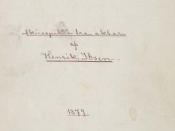How illuminating is it to read Ibsen's drama in feminist terms?The "woman question" raised by Ibsen's plays has been greatly debated, from his contemporaries to modern day critics and theatre-goers. Whilst Pillars of Society was openly feminist, his two other plays Hedda Gabbler and A Doll's House are more complex. The relevant question is whether Ibsen is writing about the rights of women or of human rights in general. Either way Ibsen caused great controversy with both plays in his time and raised important social issues that remain relevant even now. But in what terms did Ibsen intend us to read his plays? A Doll's House is the perfect example to examine this.
The critics that disagree with reading Ibsen's drama in feminist terms often quote the following statement made by Ibsen at his seventieth birthday party,"I thank you for the toast, but must disclaim the honor of having consciously worked for the women's rights movementâ¦True enough it's desirable to solve the woman problem, along with all the others, but that has not been the whole purpose.
My task has been the description of humanity."According to Ibsen himself, Nora's conflict represents something more than just that of woman's. The feminist answer to this would be a quote perhaps less widely publicised. This was said by Ibsen when sketching the play;"A woman cannot be herself in the society of today, which is exclusively a masculine society, with laws written by men, and with accusers and judges who judge feminine conduct from the masculine standpoint."Bearing this in mind, combined with knowledge of Ibsen's extremely privileged feminist education and his role in the movement, the play cannot be read in any other way than bearing feminist issues in mind. In January 1879 Ibsen proposed to the Scandinavian Society that a woman librarian be...


